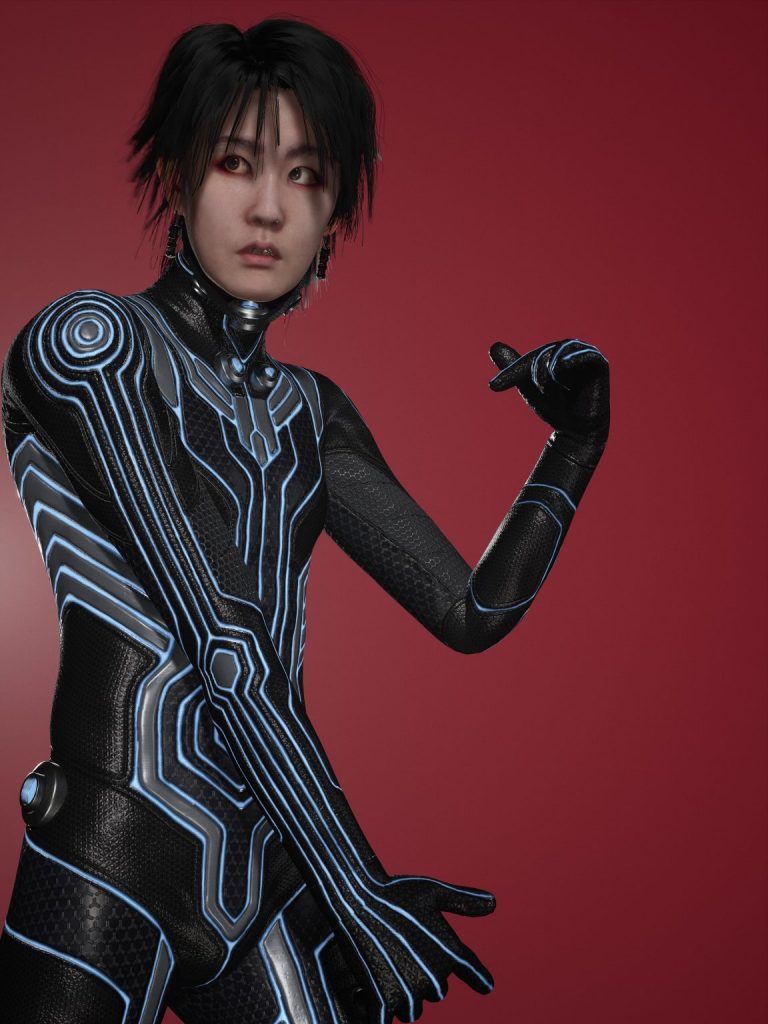In 2022, when the international travel restriction was finally lifted after COVID-19, I visited artist Lu Yang’s first solo show in the Zabludowicz Collection in London. The exhibition was situated in a huge, dark hall, featuring entertaining, thought-provoking and sometimes grotesque videos with Lu Yang’s 3D animation and installation works. Wandering in the space I was blown away by the techno-psychedelic atmosphere.
Immersed in the cultures of anime, video games and sci-fi, Lu Yang combines Buddhism, neuroscience and digital technology to investigate the mysteries and mechanics of the human body and mind. The title “LuYang NetiNeti” incorporates the Sanskrit expression “neti neti”, meaning “neither this, nor that”. The Main Hall focuses on the artist’s own avatar, DOKU, which was created using CGI animation and motion-tracking of the movements of dancers. Named after the phrase “Dokusho Dokushi,” meaning “We are born alone, and we die alone,” DOKU is a digital shell, a virtual human. Lu Yang describes DOKU, whose digital assets they have been building for nearly five years, as a reincarnation of themselves in a parallel universe—an extension of their soul into the digital realm. The six versions of DOKU that exist to date correspond to the six paths of Buddhist reincarnation: Hell, Heaven, Hungry Ghost, Animal, Asura and Human. Presented on a large screen on the altar, DOKU the Self follows a version of Lu Yang on a passenger airplane moving through numerous states of perception. The narrator contemplates the concepts of reincarnation, consciousness, and our understanding of “the self”.
Shanghai-based multimedia artist Lu Yang creates fantastical, often painful, and shocking images that represent an interdisciplinary blend of religion, philosophy, neuroscience, psychology and modern technology, as well as allusions to real-life forms and structures of natural and religious origin. The output of Lu Yang’s artistic practice spans game engines, 3D-animated films, video game installations, holograms, motion capture performances, virtual reality and software manipulation. The artist also collaborates with acclaimed scientists, psychologists, performers, designers, experimental composers, music producers, robotics companies and pop stars.

In the work DOKU the Self, Lu Yang reincarnated into a digital parallel universe. Without the constraints of time and space, being free from the shackles of physical needs and identity, DOKU is born to explore the secret of the human mind and the intention of the universe. The artist is immensely influenced by Buddhism, the words in The Larger Sutra on Amitāyus mentioned: “Alone we are born, and alone we come into the world. When we die, alone we pass away. For no one shares our fate, and none our suffering. So what are they to me, such ‘friends’ and all their hindrances?” DOKU is like a radical visual trance: in breathtaking images, we can see how DOKU lives and dies in each of these Buddhist worlds, radically freeing itself from the concept of the self and the body, and the perception of reality.
In this virtual shell, Lu Yang experiments with the notion that virtual existence can not only extend physical existence, but also replace it in the future with its unlimited possibilities—without binary categories such as natural/artificial or male/female. Lu Yang contrasts the idea of an identity anchored in the body and in chronological time with multiple identities and realities that know no fixed self but only permanent change. In collaboration with experts from different fields, Lu Yang creates a posthuman metaverse in which identities are fluid. The posthuman is also in the context of Buddhist and Hindu cosmologies. The artist’s projects begin where current scientific and technological thinking intersects with traditional spiritual and philosophical principles.
DOKU the Self is an ongoing project of the artist. Through the continuous exploration of new technologies and collaborations, Lu Yang described this as a unique way of meditation in their life, both virtually and physically.
Reference
Lu Yang – Société Berlin – SOCIÉTÉ. (n.d.). link
DOKU the Self – LUYANG.ASIA. (2023, May 20). link



Recent Comments